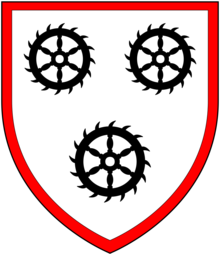Career
He served as captain of a band of lancers in the English army in the Netherlands, and in 1588 was knighted for his services. In 1597 he commanded a ship in the expedition to the Azores.
In 1601, Scott was implicated in Essex's Rebellion but succeeded in clearing himself, and in the same year was a parliamentary candidate for Kent in 1601. He was unsuccessful on this first attempt, but was elected its MP in the Parliament of 1604 and for Maidstone in the Addled Parliament of 1614.
In November 1603 Anne of Denmark appointed him as one of the advisors for the administration of her English jointure lands. [2] Scott was an early investor in the Colony of Virginia. He became a member of the Council for Virginia in 1607, the year when that colony was re-established, subscribing £75, and was a councillor of the Virginia Company of London in 1609.
He died in 1616 and was buried at Brabourne in Kent.
This page is based on this
Wikipedia article Text is available under the
CC BY-SA 4.0 license; additional terms may apply.
Images, videos and audio are available under their respective licenses.




